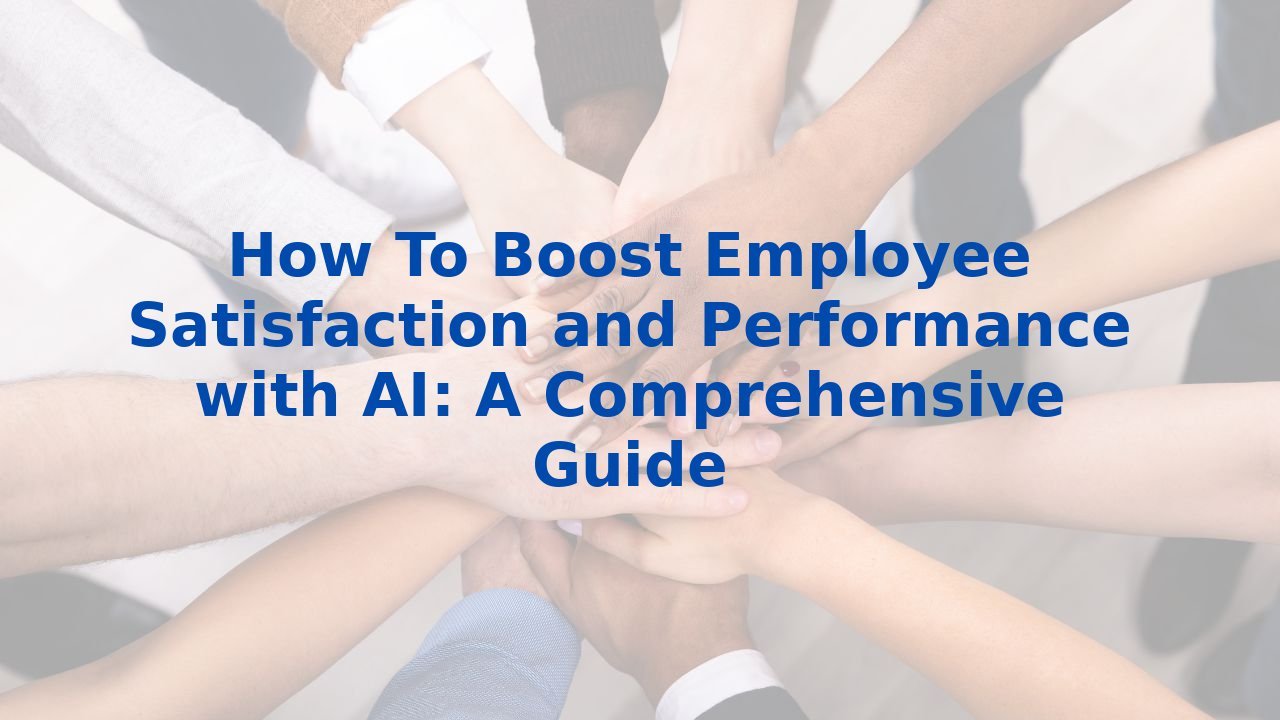How To Boost Employee Satisfaction and Performance with AI: A Comprehensive Guide
Enhancing Employee Satisfaction and Performance with AI
Introduction
In today's fast-paced business environment, where change is the only constant, employee satisfaction and performance stand as cornerstones for organizational triumph. A recent survey by McKinsey illustrates a crucial insight: workers who perceive growth opportunities and receive strong support from their leaders report significantly higher levels of satisfaction. In contrast, the absence of career progression often signals discontent among employees. According to a Harvard Business Review study, organizations boasting high employee satisfaction levels can outperform their counterparts by a remarkable 202%. When employees are truly engaged and passionate about their work, their contributions drive not just individual success but overall company prosperity.
The Role of AI in Enhancing Employee Satisfaction
This is where the transformative power of Artificial Intelligence (AI) comes into play. Imagine harnessing AI to tackle the very roots of employee dissatisfaction. Here’s how AI can create meaningful change:
- Personalized Career Development: AI can sift through employee data to unveil tailored growth pathways, ensuring that each team member feels recognized and supported. When employees see that their personal and professional growth is a priority, motivation soars.
- Efficient Communication: Streamlined, AI-powered communication tools can eliminate the clamor of misinformation, ensuring that employees receive timely updates. This clarity not only cuts down on frustration but also ignites productivity.
- Workplace Analytics: With AI-driven analytics, organizations gain valuable insights into employee engagement. This data allows managers to pinpoint sectors where staff may feel undervalued, leading to targeted and effective interventions.
- Automated Tasks: By automating mundane and repetitive tasks, AI doesn’t just enhance efficiency—it empowers employees. Freed from the shackles of routine drudgery, they can dedicate their talents to more strategic and creative pursuits, reigniting their passion for work.
Benefits of AI Training for Employees
While the potential benefits of AI are vast, its impact is contingent upon the knowledge and skills of your workforce. Training your employees to leverage AI tools efficiently is pivotal. Here are some compelling benefits of AI training:
- Skill Development: Equipping employees with AI skills enhances their versatility, leading to a workforce that is not only competent but also confident. This growth fosters greater job satisfaction as individuals feel they contribute more effectively to their teams.
- Adoption and Integration: Effective training ensures that employees aren’t just aware of AI tools; they know how to seamlessly integrate them into their daily routines. This smooth transition promotes a culture of innovation and efficiency.
- Ethical Use: Emphasizing the ethical implications of AI usage is vital. Training creates awareness of potential biases and limitations inherent in AI systems, fostering a responsible culture of AI within the organization.
Conclusion
In conclusion, the integration of AI holds immense potential to elevate employee satisfaction and performance by addressing key areas of disenchantment. By leveraging AI for personalized career development, enhancing communication, offering workplace analytics, and automating tedious tasks, organizations can cultivate a more engaging work atmosphere. Moreover, the significance of training employees to effectively navigate AI tools cannot be overstated; it’s a linchpin for successful integration and ethical application. When these strategies converge, businesses pave the way for heightened employee satisfaction, which correlates directly with improved financial performance and customer contentment.
Embrace the future. Equip your workforce not just for today, but for the progressive landscape of tomorrow. For tailored AI training solutions that prepare your entire organization for the shifts ahead, consider exploring what comprehensive training can offer.



